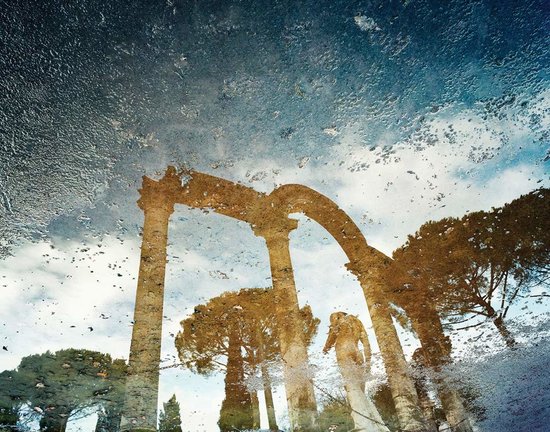
Alfred Seiland (Bilingual edition)
A 15-year photography project dedicated to mythic sites of the ancient Roman world, reinterpreted by the great Austrian photographer in surprising, unexpected ways
Through a wide selection of extraordinary images taken from Alfred Seiland's monumental work IMPERIVM ROMANVM, this book offers an ideal transcontinental grand tour through forty different countries, focusing on emblematic archaeological sites such as Rome, Palmyra, Samaria and Epidaurus.
The Austrian artist travelled through the territories of the Roman empire at its maximum extension, from Syria to Scotland and beyond, capturing on film the subtle and diverse interactions between men and ruins.
With photographs at times hyper-realist and pop, at others symbolist and minimal, the project illustrates the inextricable, dynamic relationship between Roman archaeological sites and the places of modernity. Beyond that, the Roman ruins are clearly revealed as the great common heritage of a European visual identity, a sort of lowest common denominator of modern art and contemporary architecture, the first form of globalization of the gaze. The book incites the reader to discover the transformations of cities and landscapes: the photographer's eye accentuates their sometimes intentional, sometimes fortuitous re-use while also manifesting with characteristic irony the surreal dialogue between the glorious ancient monuments and the modern city.
It is not easy to translate into photographs the possible significance and meaning of the ancient world - or more precisely, ancient ruins - for contemporary society. With this long-term work-in-progress, Seiland reveals traces, even in our globalized world, of the sense of community bequeathed by the Roman empire: from the archaeological finds in museums to the archaeological remains in today's landscape. A new meaning of the concept of pan-European integration emerges from these images, an integration begun by the Roman empire and consolidated through centuries of dominion, but which has been adapted, transformed, and destroyed by historical and cultural events in the various countries.
Through a wide selection of extraordinary images taken from Alfred Seiland's monumental work IMPERIVM ROMANVM, this book offers an ideal transcontinental grand tour through forty different countries, focusing on emblematic archaeological sites such as Rome, Palmyra, Samaria and Epidaurus.
The Austrian artist travelled through the territories of the Roman empire at its maximum extension, from Syria to Scotland and beyond, capturing on film the subtle and diverse interactions between men and ruins.
With photographs at times hyper-realist and pop, at others symbolist and minimal, the project illustrates the inextricable, dynamic relationship between Roman archaeological sites and the places of modernity. Beyond that, the Roman ruins are clearly revealed as the great common heritage of a European visual identity, a sort of lowest common denominator of modern art and contemporary architecture, the first form of globalization of the gaze. The book incites the reader to discover the transformations of cities and landscapes: the photographer's eye accentuates their sometimes intentional, sometimes fortuitous re-use while also manifesting with characteristic irony the surreal dialogue between the glorious ancient monuments and the modern city.
It is not easy to translate into photographs the possible significance and meaning of the ancient world - or more precisely, ancient ruins - for contemporary society. With this long-term work-in-progress, Seiland reveals traces, even in our globalized world, of the sense of community bequeathed by the Roman empire: from the archaeological finds in museums to the archaeological remains in today's landscape. A new meaning of the concept of pan-European integration emerges from these images, an integration begun by the Roman empire and consolidated through centuries of dominion, but which has been adapted, transformed, and destroyed by historical and cultural events in the various countries.
| Auteur | | Filippo Maggia |
| Taal | | Engels |
| Type | | Hardcover |
| Categorie | | Kunst & Fotografie |